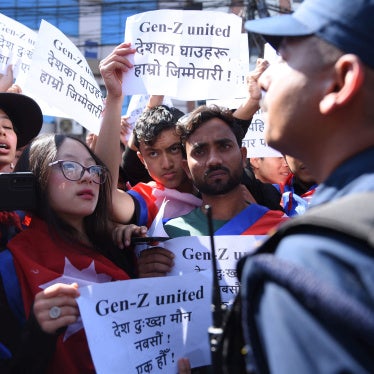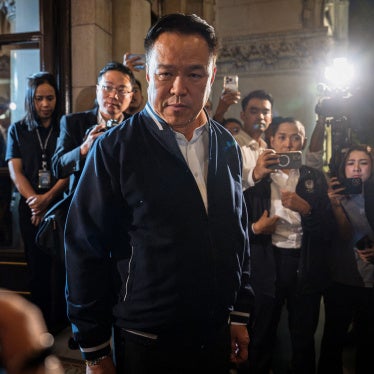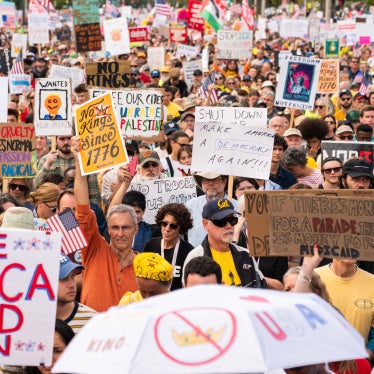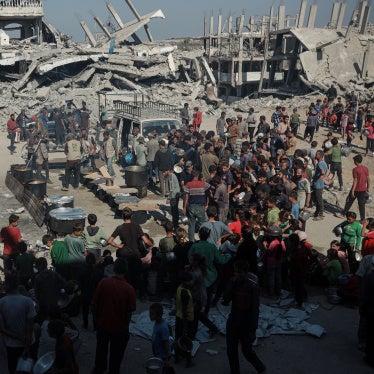(New York) - The Vietnam government intensified its repression of activists and dissidents during 2010, and cracked down harshly on freedom of expression, association, and assembly, Human Rights Watch said today in its World Report 2011.
The 649-page report, Human Rights Watch's 21st annual review of human rights practices around the globe, summarizes major human rights developments in more than 90 countries and territories worldwide. In Vietnam, bloggers, human rights defenders, workers rights activists, and democracy and anti-corruption campaigners faced intimidation, arrest, torture, and imprisonment, Human Rights Watch said.
Download the complete report > [PDF, 4 MB]
"Peacefully expressing views should not be a crime, but the government apparently fears what these individuals have to say," said Phil Robertson, deputy Asia director at Human Rights Watch. "What's needed now is for Vietnam's international donors to clearly tell the government to release all dissidents arrested for peaceful activities."
Throughout 2010, the government prosecuted peaceful dissidents and sentenced them to prison, including Le Cong Dinh, a prominent lawyer; Tran Huynh Duy Thuc, Le Thang Long, and Nguyen Tien Trung, pro-democracy activists; Tran Khai Thanh Thuy, a journalist; and Pham Thanh Nghien, an advocate for free expression. In October, the government sentenced three labor activists from the United Farmers and Workers Organization (UFWO) to long prison terms.
Continuing its crackdown, the government recently arrested but has not yet tried Phan Thanh Hai (Anhbasg), a blogger; Cu Huy Ha Vu, an outspoken legal activist; Vi Duc Hoi, a magazine editor; and Ho Thi Bich Khuong and Pastor Ho Trung Ton, land rights campaigners. Nguyen Van Hai (Dieu Cay), a blogger, completed a two-and-a-half-year prison sentence, but authorities refused to release him.
Freedom of religion in Vietnam fared little better as police subjected members of independent religious groups to repeated harassment. The government targeted unrecognized branches of the Cao Dai church, the Hoa Hao church, independent Protestant house churches, the Khmer Krom Buddhist temples, and the Unified Buddhist Church of Vietnam (UBCV). A Mennonite pastor, Duong Kim Khai, is currently in detention awaiting trial. Religious leaders including the UBCV Supreme Patriarch, Thich Quang Do; Catholic priest Nguyen Van Ly and a Khmer Krom Buddhist abbot, Thach Sophon, were held under house arrest.
"The United States should re-designate Vietnam a ‘country of particular concern' for its continuous violations of religious freedom," Robertson said. "Vietnam's crackdown on religion is systematic, severe, and getting worse by the day."
Police brutality, including torture in detention and deaths in custody, was a major problem throughout the year. Prisoners routinely face abuse and torture in prison, and those held in drug rehabilitation centers face inhumane treatment, including forced labor. In a number of cases, individuals arrested for misdemeanors, such as traffic violations, were beaten to death in police custody. The death in custody of Nguyen Van Khuong in Bac Giang province in July set off a protest by thousands of people demanding accountability.
Public protests against land confiscation by authorities and well-connected businessmen were sometimes dispersed by the police with excessive force, such as during a funeral procession that turned into a protest in Con Dau parish in Da Nang in May.
"The police in Vietnam violate rights with impunity, and the government too often looks the other way in the interest of maintaining order," Robertson said. "Police brutality was reported in all regions of Vietnam, but central government authorities responded with a deafening silence."
Vietnam extended its extensive regime of media and internet censorship with an internet firewall, and new onerous and restrictive regulations requiring monitoring by internet companies and internet café owners of internet use by Vietnamese citizens. The Vietnam government also pressured neighboring countries such as Cambodia and Thailand to crack down on peaceful anti-Vietnam government activities such as distributing leaflets and holding a news conference.
"To gag its own citizens in Vietnam for expressing their views is bad enough," Robertson said. "But the Vietnam government's efforts to extend censorship to other countries and the internet deserves severe condemnation from the international community."








